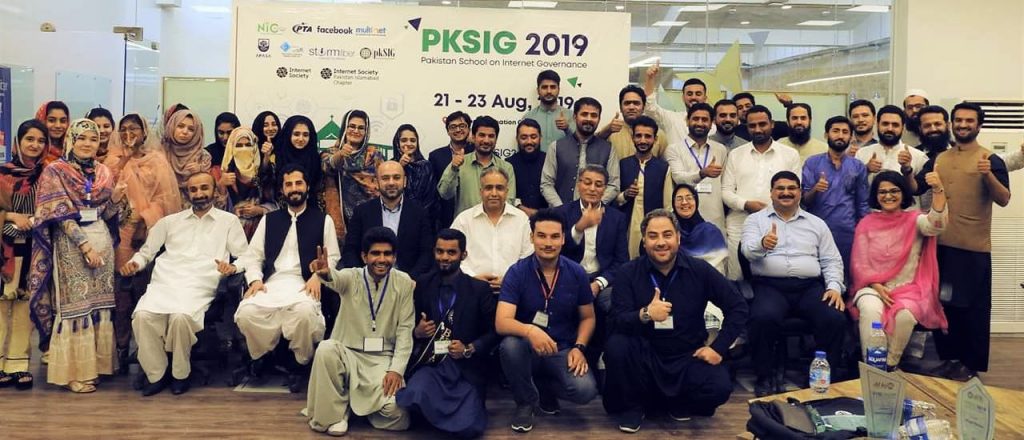Author Archives: Waqas Hassan
Author Archives: Waqas Hassan

The 5th Pakistan School on Internet Governance (pkSIG 2019) was successfully held last month in Quetta, Pakistan. This represents a significant achievement for the Internet Society Pakistan Islamabad Chapter as it played an instrumental role in bringing the first-ever Internet Governance event to the provincial capital of Balochistan.
For those who may not know, Balochistan has the largest land area among the four provinces of Pakistan, yet it is the least populated and least developed. Only 27% of its population lives in urban areas and Internet penetration is low. Finding adequate sponsors, and more importantly, diversity among the students to participate was a critical concern. But, pkSIG 2019 in Quetta proved to be one of the best editions of this school.
Over 60 people (one-third of them female) registered for the event, including students, professionals, startup founders, speakers, and some guests who showed keen interest in the program. Following a four-week long process of registration and shortlisting, 35 students were selected for pkSIG 2019 and five were awarded fellowships. Since all the sessions were livestreamed, a sizeable audience participated online as well. (The sessions and presentations are available online.)
“It’s our fifth consecutive year conducting pkSIG – Continue reading

Last year, at the Internet Society Asia-Pacific and Middle-East Chapters Meeting, I was introduced to the series of easily-digestible and thought-provoking issue papers published by the Internet Society. Particularly, the one on digital accessibility had me shaking in disbelief. It stated that one in six people in the Asia-Pacific region lives with disability – that is a total of about 650 million people.

The Internet Society Pakistan Islamabad Chapter had always been active in promoting digital accessibility, but I realized that we need to do more, especially at the transnational level. Thus, the idea of organizing a regional forum on digital accessibility was born, and with support from the Internet Society Asia-Pacific Bureau, it became a reality.
The Regional Forum on Digital Accessibility was successfully held on 7 February in Islamabad. It brought together 120 participants, including Internet Society Chapter leaders from Afghanistan and Nepal, fellows from Sri Lanka, and speakers from India.
A major achievement emerging from the forum was the vow from Pakistan’s high-level government officials to include representation of persons with disabilities in the recently-established Prime Minister’s Task Force on Information Technology (IT) and Telecom that is developing a roadmap for Pakistan’s digital transformation. There was Continue reading
The Internet Society Pakistan Islamabad Chapter (PK IBD) organised a webinar on “Digital Empowerment of Women in South Asia” on 15 March, 2018. ISOC Chapter leaders, members, and staff participated in the webinar where the regional and global women-centric initiatives were shared by the speakers.
The undersigned welcomed the audience on behalf of the Internet Society Pakistan Islamabad Chapter followed by a round of introductions. Joyce Dogniez, the Internet Society’s Senior Director, Global Community Engagement, shared the importance and relevance of the UN-EQUALS partnership which is a unique collaboration between state and non-state actors to bridge the digital gender divide. Joyce shared that the Internet Society is an important part of this partnership that primarily emphasizes improving ICT access, imparting digital skills, and promoting leadership of women. Internet and digital literacy leads to economic empowerment of women that can have a profound community impact.
The next session featured updates from the Chapter Leaders of South Asia on the various initiatives being undertaken on the country and Chapter level. Sagarika Wickramasekera from the ISOC Sri Lanka Chapter informed about the initiatives of the Chapter including WomenIGF, IT trainings for girls at school level, Internet learning programmes for women entrepreneurship, etc. Sidra Jalil from Continue reading
The Internet is borderless, decentralised and indiscriminate, and it can empower people across class, colour and social status. But one question has always intrigued me: How can the universality of the Internet be ensured and sustained? I received the theoretical response to this question at the Pakistan School on Internet Governance in 2016 where I learned about the multistakeholder model and community-driven approaches to addressing the broad range of complex issues of the Internet ecosystem. Being part of a telecom regulator in South Asia that generally follows the chain of command, the idea of inclusive policies and programmes was truly a revelation. I decided to explore further and applied for a fellowship to the 2017 Asia-Pacific Regional Internet Governance Forum (APrIGF) and the Asia-Pacific School on Internet Governance (APSIG).
APSIG kicked off on 22 July, followed by APrIGF that ended on 29 July in the beautiful city of Bangkok, Thailand. APSIG had a fantastic line up of speakers that touched upon advanced topics like the Internet governance ecosystem, data governance, cybersecurity, Internet of Things governance, gender equality and the digital economy. The learnings I gained from APSIG laid an ideal foundation for me to contribute to Continue reading